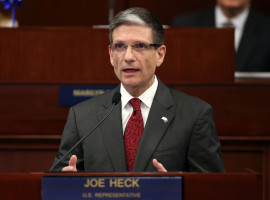
National Park Service lost millions during partial government shutdown
In today's Federal Newscast, an internal email to staff at the National Park Service explained the effect the partial government shutdown had on the agency.
To listen to the Federal Newscast on your phone or mobile device, subscribe on PodcastOne or Apple Podcasts. The best listening experience on desktop can be found using Chrome, Firefox or Safari.
- It looks like the National Park Service lost between $10 million and $11 million during the partial government shutdown. The Hill reported an internal email sent to NPS staff suggesting it had a detrimental effect on worker morale. Attorneys are investigating if it was legal for the Interior Department to use recreation fees to pay for maintenance and trash collection. (The Hill)
- The Interior Business Center had more than 2,000 payments waiting to go out to its vendors after the 35-day partial government shutdown ended. The shutdown also interrupted about 400 payments the center expects to make to vendors on behalf of other agencies. It started paying contractors back on Jan. 29, and will process and pay new invoices as they come in.
- The Census Bureau joined a growing number of agencies offering a bug bounty program, as it gets set for the 2020 population count. The ramped-up security comes after Ron Jarmin, the Census Bureau’s deputy director, warned of the threat of a disinformation campaign during the 2020 population count. The Department of Homeland Security is working with the intelligence community and the private sector to provide census-specific cybersecurity. (Federal News Network)
- The Centers of Excellence IT modernization initiative is ready to expand. The General Services Administration wants to create a multiple award contract so every agency can take advantage of the Centers of Excellence approach to IT modernization. GSA released a request for information seeking industry input on how they would provide assessment services across all seven CoE task areas. These services are considered phase 1 of the CoE where the agency works with a vendor to identify modernization priorities. GSA is adding information security and workforce transformation as two new areas for discovery. Comments on the RFI are due Feb. 8. (General Services Administration)
- Christina Calvosa is finally losing the word “interim” from her title as chief information officer for the Federal Communications Commission. After a year as acting CIO, FCC Chairman Ajit Pai named Calvosa as the permanent lead technology executive. She replaced David Bray, who left in August 2017. Calvosa was deputy CIO at the FCC for the previous three years and worked at the Agriculture Department before coming to the commission. (Federal Communications Commission)
- The Army activated its artificial intelligence task force, which will let the Army connect with the broader AI community, top universities and tech savvy companies. The task force’s initial priorities are for applications of AI to equipment maintenance and logistics, situational awareness, and humanitarian assistance and disaster relief. It’s overseen by the new Army Futures Command and will be based at Carnegie Mellon University in Pittsburgh. (Carnegie Mellon University)
- The Army is exploring ways to outsource many of the IT services on its bases. It issued a request for information late last week, looking for input from vendors on a concept it calls “Network Enterprise Center as-a-service.” Responses are due in mid-March. The service wants to know how contractors might be able to take over a wide range of responsibilities ranging from local software development and email support to network management and printer maintenance. Officials said they’re looking for a “turn-key, managed services approach to IT, telecommunications, and cybersecurity services.” (FedBizOpps)
- The backlog of pending background investigations is down nearly 22 percent since its peak this past April. The National Background Investigations Bureau said the total backlog sits at nearly 567,000 security clearances and other investigatory matters. NBIB attributed the success to new business process re-engineering initiatives and more automation. NBIB is still waiting for the president to sign an executive order that will transfer the entire security clearance portfolio to the Pentagon. (Office of Personnel Management)
- Senate Intelligence Vice Chairman Mark Warner (D-Va.) is urging the Trump administration to act quickly on long-awaited improvements to the security clearance process. Warner writes to the members of the Performance Accountability Council, including acting Office of Personnel Management Director Margaret Weichert. Warner said he wants to see the administration’s plan for transferring the security clearance portfolio from OPM to the Pentagon. He’s reintroduced legislation in the Senate, that would codify improvements to the background investigation process. (Sen. Mark Warner)
- The Government Accountability Office is giving the Defense Department some new options to keep better track of emergency war funding. GAO outlined these options in a new report as required in the 2018 National Defense Authorization Act. One option is for Congress to create separate appropriations accounts for overseas contingency funds and for DoD’s base budget. Another option is to keep OCO funds in a non-expiring transfer account. Critics of OCO fear the account is used like a slush fund for DoD, causing more scrutiny over how the dollars are separated. (Government Accountability Office)
Copyright © 2024 Federal News Network. All rights reserved. This website is not intended for users located within the European Economic Area.
Eric White
Eric White is news anchor and Federal Drive producer at Federal News Network.
Follow @FEDERALNEWSCAST
Related Stories
Related Topics
2020 Census
Acquisition Policy
All News
Army
Artificial Intelligence
centers of excellence
Christina Calvosa
Congress
Contracting
Cybersecurity
Defense
Defense News
Donald Trump
Federal Communications Commission
Federal Drive
Federal Newscast
General Services Administration
Government Accountability Office
government shutdown
Government Shutdown
Interior Business Center
Interior Department
IT Modernization
Management
Mark Warner
National Background Investigations Bureau
National Park Service
Office of Personnel Management
partial government shutdown
Security clearances
Technology
White House
Workforce





